I’m a sucker for stories in which gods are real and meddle in the lives of humans, for better or worse. (I was beside myself in the latest Megan Whalen Turner book, The Return of the Thief, when a lightning bolt answered Eugenides’ wrath and smote a certain enemy in his campaign tent.) Thinking about gods, and casting my eyes about me for books I’ve recently loved, it struck me that a good number of them involved lost, missing, and forgotten gods, and I seized on this theme because it’s also a vague but major hint about my own secret book that I’ve been writing for the past two years! All of these are recent favorites, and most happen to be pretty new, or else newly available in the US and UK.
The Absolute Book by Elizabeth Knox
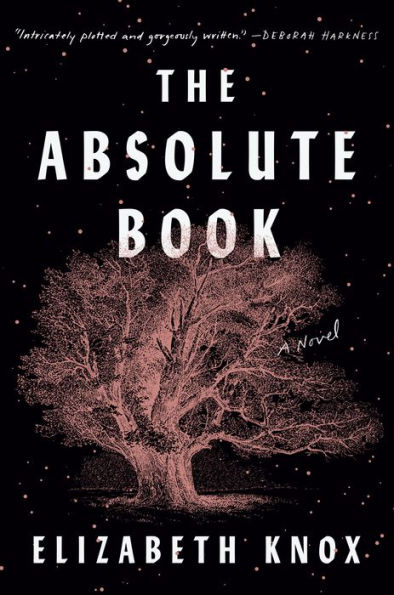
This book is a sprawling, gorgeous, intimate, epic mash-up of myths, and an “arcane thriller,” by one of my favorite authors, and is newly available in the US and UK. Powerfully grounded in real-world questions of grief and the soul, it’s also a literary portal fantasy that will take you to Purgatory, the gates of Hell, the world of the Sidhe, and even as far as New Zealand (where Knox is from). When Taryn is a teenager, her sister is murdered by a would-be rapist who doesn’t go through with it, and the lenience of his sentence drives her to arrange for more appropriate justice—thus damning herself, as she discovers some years later. Now a successful author, Taryn attracts strange attention for her book about library fires, is possessed by a demon searching for a lost scroll box, and rescued by a strange young man who wears a golden claw glove on a cord around his neck. The subsequent story is big, and involves several of the most iconic archetypes of the Western imagination, but not as you’ve ever seen them before. I’ll leave you to discover who the lost god is here. I wouldn’t want to spoil the surprise.
Odin’s Child by Siri Pettersen
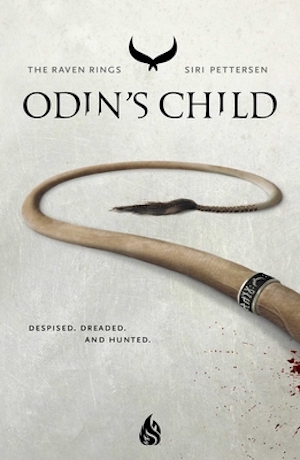
The Raven Rings trilogy, from Norwegian author Siri Pettersen, has been wildly popular across Europe for a few years now, and I’m so glad it’s finally in English. I loved it deeply from the first to the last word, and was instantly and thoroughly immersed. The story of Hirka “the tailless girl,” it’s set in a Norse-inspired world called Ym, in which all people have tails—except for Hirka, a young girl on the cusp of womanhood, whose time has come to participate in “the Rite.” It’s an annual ritual in which all ymlings display their ability to manipulate the natural energy of their world. Unthinkably, Hirka’s never been able to do it, and as the Rite approaches, her father drops a major bombshell that upends everything she thought she knew about herself, leaving her orphaned, alone in the world, and afraid she might be the abomination everybody believes she is: a child of Odin, not from this world. Add in Rime, the blue-blooded warrior boy who was her childhood rival; Urd, a truly vile villain; and—oh yes, the theme!—the Seer, a living god who is only ever seen by the ruling council, and you’ve got the makings of a terrific tale. Books two and three come out in English this fall and winter, and I can’t wait.
Deeplight by Frances Hardinge
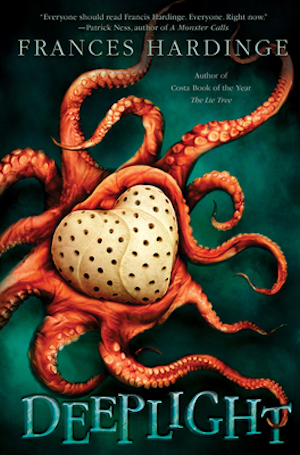
The gods of Deeplight are not the sort of gods you’d wish to be real. They were, though, once. Huge, monstrous sea creatures (bizarre as only Hardinge can do bizarre—so beautifully, wondrously strange), they tormented the island chain called the Myriad, causing mayhem in their violent clashes to the death. Until they all killed each other, that is: every last one, leaving the waters becalmed. Now smugglers trade in their disembodied parts, and when fifteen-year-old street kid Hark gets caught in one of his best friend Jelt’s mad money-making schemes, he ends up indentured to a scientist doing her own illicit work with their remains. Hark’s loyalty to the undeserving Jelt is heartbreaking, and derails his life yet further when, nearly dying in another mad scheme, the pair come into possession of a piece of godware whose sinister power endangers not just their own lives but the entire Myriad. If you haven’t read Hardinge before, get ready for stunning prose, a truly wild imagination, and a ton of heart. Her powers are astonishing.
The Left-Handed Booksellers of London by Garth Nix
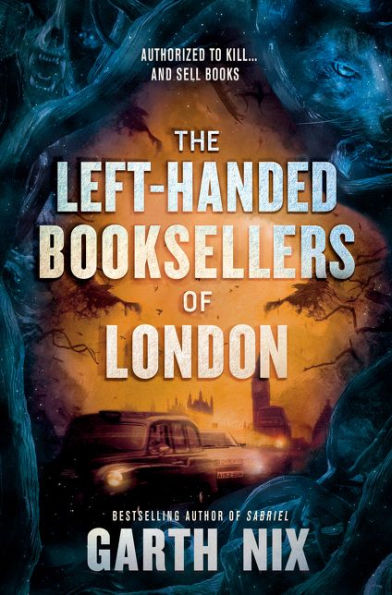
Garth Nix has been a favorite author of mine since I rediscovered books for teens as an adult, searching for my writing niche. His Sabriel series was formative for me. This one’s very different, set in 1980s London, and is a huge amount of fun. Susan Arkshaw has but barely moved to the city for art school when, trying to find out about the father she never knew, she falls afoul of the country’s unruly supernatural element. Rescued by Merlin, a gorgeous young man who’s as apt to dress in women’s clothes as men’s, she gets a crash course in the Old World, and in the booksellers who run interference between it and the modern one. (Why booksellers? Well, because they have to make a living, don’t they?) Merlin is one of the left-handed booksellers, his sister Vivien one of the right. Their skill sets are different but their mission is the same: keep the Old World denizens from causing trouble. But with Susan around, that proves impossible, so they set out to learn who’s after her and why. And yes, it involves a lost god or two.
Noragami by Adachitoka
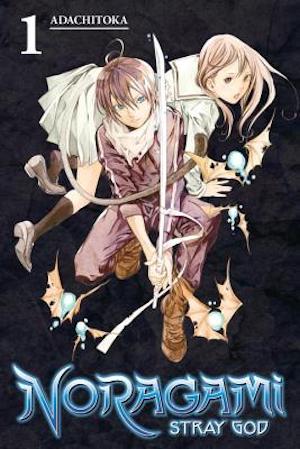
This was one of the first manga series I fell in love with, late to the game, five or six years ago. I recently watched the anime and picked the series back up, and it’s fabulous: the story of Yato, an unknown god whose dream is to have a shrine of his own so that he won’t have to worry about obsolescence, since gods’ continued existence depends on being remembered. He’s trying to make his name by doing odd jobs—which is a far cry from his bloody past as a god of calamity. The worldbuilding, based loosely on the Japanese pantheon, is extraordinary, with gods binding the spirits of the dead into their service as “regalia,” such as weapons with which they fight phantoms to protect the “near shore,” or human world. The story focuses on Yato’s relationship with his regalia and a human girl whose soul keeps slipping out of her body, and is both hilarious and heartfelt. The art is absolutely gorgeous too, and I was very sorry to learn that one of the two creators (Adachitoka is a portmanteau for two mangaka) has been ill, resulting in the series’s long pause. It looks like it’s back now, with issue #23 scheduled for this summer.
Buy the Book
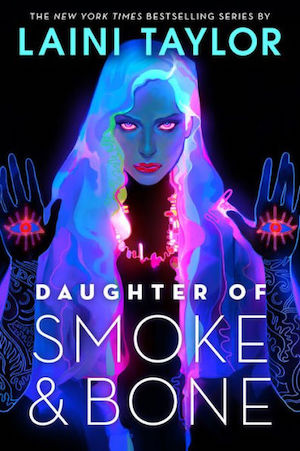

Daughter of Smoke and Bone
Laini Taylor is the New York Times bestselling author of the Printz Honor Book Strange the Dreamer and its sequel, Muse of Nightmares. Taylor is also the author of the global sensation the Daughter of Smoke & Bone trilogy and the companion novella Night of Cake & Puppets. Taylor’s other works include the Dreamdark books: Blackbringer and Silksinger, and the National Book Award finalist Lips Touch: Three Times. She lives in Portland, Oregon, with her husband, illustrator Jim Di Bartolo, and their daughter, Clementine.










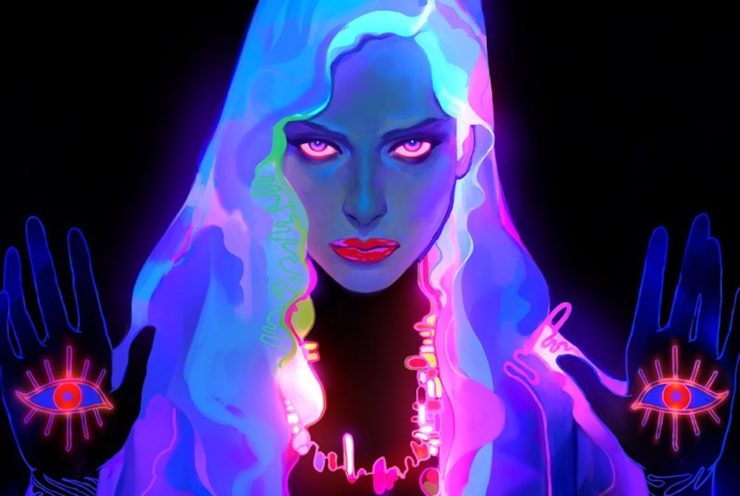
Terry Pratchett’s “Small Gods” says it right there on the tin. One of the finest discussions on belief and the nature of organised religion, and funny too.
I read Deeplight last year as it was a finalist for the Lodestar award administered by the Worldcon Hugo committee. I enjoyed it a great deal and agree with Lanni’s comments here. I haven’t had time to look for other work by Hardinge, but I need to. If the rest is as good I really need to read it.
“American Gods.”
I shouldn’t have to recommend N.K. Jemisin’s Inheritance trilogy (starting with The Hundred Thousand Kingdoms), where there are gods great and small, some enslaved, some abdicated, some missing. More fun than The Broken Earth, perhaps a bit less socially significant (although race plays a part).
One Man: A City of Fallen Gods Novel by Harry Connolly is set in a city built upon the skeleton of two murdered gods – “a big, odd, ambitious book about crime and magic and a screwed-up guy who has one last chance to do something decent in this world.”
The Craft Sequence by Max Gladstone is based on on going and perpetual negotiations between gods and peoples.
My first thought, like @1, was Pratchett. My second was Robert Jackson Bennett’s superb Divine Cities trilogy, starting with City of Stairs.
I’ll put in a recommendation for The Atomic Blood-Stained Bus about an immortal Druid, a forgotten god who got kicked out of heaven, and the magic bus of the title that they roam around England in. Hijinks ensue.
ZEUS IS DEAD: A MONSTROUSLY INCONVENIENT ADVENTURE, Michael G. Munz. Comic contemporary fantasy. Zeus has been murdered so the other Greek Gods break his law that they cannot interact with humans and intrude in a major way by reintroducing monsters to the real world, interfering with humans, expecting worship, and holding press conferences.
DEATH AND RELAXATION, Devon Monk. “Ordinary Magic” Book 1. Urban fantasy. The town of Ordinary, Oregon, is anything but. It’s the vacation spot for gods and monsters, but the gods must put away their powers and immortality when staying. Police Chief Delaney Reed not only is the law, she is the bridge between mortals and gods, and one of those gods have been murdered.
Stormlight series by Sanderson.
Malazan series by Erickson and Esselmont.
Wheel of Time – and by that I mean who is the ALL CAPS voice at the end of Eye of the World.
Brust’s Taltos books have many gods.
Heaven Official’s Blessing fits the bill. It’s a danmei xanxia novel about a Prince that ascends into heaven at a young age, but due to reasons, he gets banished. Twice. 800 years later, he ascends a third time as the laughingstock of the 3 realms. It’s very funny and cute, but fair warning, it can get very dark too. It’s one of those books that’ll make you think about it for a very long time after you finish reading.
May I recommend Francesca Forrest’s wonderful novelette/novella combo “The Inconvenient God” and “Lagoonfire,” about a society in which the current government (The Polity) sends Decommissioners to, well, decommission older and fading gods. The main character, Decommissioner Thirty-Seven, is a woman with a tangled family history as well as a personal history connected to some of the gods she’s decommissioned (decommissioning isn’t killing — the gods are just made mortal). These are the start of a series that I hope continues for quite some time.
Jitterbug perfume by Tom Robbins
and even the “Incarnations of immortality” series, especially the book on satan
Simon r green’s nightside series The Nightside. That square mile of Hell in the middle of the city, where it’s always three A.M. Where you can walk beside myths and drink with monsters. Where nothing is what it seems and everything is possible.
In Joel Rosenberg’s “Keepers of the Hidden Ways” books, Thor is dead, Freya is an innkeeper who bakes wonderful apple pies, and the great weapons have gone missing.
I recently read and enjoyed Georgina Kamsika’s Goddess of the North, in which one aspect of a forgotten Hindu goddess is serving as a police officer in Britain, policing the supernatural as well as the mundane. You’ll need to look past the murky, abstract cover and the many excess coordinate commas, which may make this a less popular book than it deserves to be, based on the storytelling. But it examines immigration and nativism in a really compelling way and is also, and inextricably from that examination, an excellent urban fantasy story.
Barry Hughart’s Bridge of Birds includes a lost minor goddess in a lovely maze of Chinese myth and folklore.
T Kingfisher’s Paladin’s Grace and Paladin’s Strength involve berserker paladins left broken by the death of their god. Also fluffy romance and headless corpses. Everything a reader could want, really.
The Wicked + the Divine Kieran Gillan & Jamie McKelvie (et al.) is all about gods, power, and also performance and creativity.
Lois McMaster Bujold’s “Sharing Knife” series, in which the gods are so long gone that we never (to my recollection) hear anything at all about them except for the common use of “Absent gods!” as an expression of exasperation.
We might also stretch a point for Seanan McGuire’s “October Daye” books. The Fae progenitors, Maeve, Titania and Oberon, may not be gods exactly, but they’re close enough. And very definitely missing.
@18: second the recommendation of Ursula Vernon’s Paladins. I’m also reminded of her earlier Hugo-winning web comic, “Digger.” A very peculiar epic about a wombat and a sort-of-dead god.
God going AWOL is a major driving force in Garth Ennis’ Preacher…
May not entirely match but I suggest:
Zelazny’s Lord of Light
Harry Turtledove’s The Case of the Toxic Spell-Dump has thoughts about what happens AFTER a god has been forgotten.
Louise Cooper’s The Time Master trilogy (The Initiate, The Outcast, The Master) would fit this list very well. A little harder to find but worth it.
Someone beat me to recommending Digger, by Ursula Vernon. There’s an undead god, creepy caverns, very weird lizards obsessed with skin, hyenas everywhere, and geology jokes. It’s freaking amazing.
“The Prey of Gods” by Nicky Drayden
Max Gladstone’s Three Parts Dead features a couple of dead gods, along with a very clever way one of them was kept alive.
#3 beat me to it. The ENTIRE premise of Gaiman’s “American Gods” is lost and forgotten; the Old versus the New. Like so many other ‘lists,’ this is sadly missing a critical item.
Ben Aaronovitch’s Rivers of London series is a delightful urban fantasy/mystery mashup that features forgotten river gods. It’s also great for learning about the geography of London.
P.C.Hodgell’s excellent Kencyrath books. 3 peoples thrown together as one to fight a losing battle from world to world down the chain of creation against a devouring evil by a god that even the most devout suspects has abandoned them.
David Zindel. A Requiem for Homosapiens.
Neverness
Broken God.
The Wild.
War in Heaven.
I recommend reading The God Engines by John Scalzi.
This theme makes me think of a fairly old book, “God Stalk” by P.C. Hodgell. It was pretty big at the time, but Hodgell has been largely forgotten now, even though as far as I can tell she’s still slowly writing bits and pieces of the tale associated with that first book.
The main character, a young woman with various amazing skills and a very dangerous heritage, comes into a city that is chock full of gods, some new, some old, some forgotten, some dead . . . actually arriving on the night of the Feast of Dead Gods, when everyone in town has their doors and shutters bolted because the ghosts of myriad lost gods haunt the town that night. In trying to figure out the nature of the gods, she ends up almost-killing and then resurrecting a god.
She herself has a complicated relationship with a much more powerful but rather aloof god–her people have been retreating through reality after reality, trying to stop or at least slow down the destruction caused by Perimal Darkling, who swallows up worlds like popcorn, and growing more and more bitter at their god’s apparent failure to do much to help, aside from bequeathing them some rather insufficient powers and a sterile social system. She herself may play a part, perhaps a very big part, in some prophecies which suggest the universes may yet be saved. Despite all this, the book is often pretty funny. She’s a great character and the whole thing drips with cool images and texture and . . . stuff.
I have to recommend The Library at Mount Char by Scott Hawkins as one of the wierdest and most terrifying books I’ve read in years. 12 adopted orphans have to cope when Father goes missing. Is he God, the Devil, or something else? What’s the purpose of the strange library they’re forced to study in? Scenes from this book still haunt me years later.
On a related note, a story about gods struggling not to be forgotten, plus a rollicking good anime-style tale! Wen Spencer’s Eight Million Gods.
Has anyone read Felix Gilman’s Thunderer or Gears of the City? Good novels of a man who goes searching for his city’s lost god.
How about Macrocosmic God?
Not a book, but worth noting as an example that this is a setting of long standing: Thespis, or, The Gods Grown Old. This was the first collaboration of Gilbert and Sullivan; a theatrical troupe takes the place of the out-of-fashion Olympians, with predictable (for G&S) results. Sullivan apparently thought so little of it despite its relative success (it was written for the Christmas season but played well into the new year) that the music is ~lost, but the libretto is findable in any complete G&S text.
On the same theme, Marie Phillips’s Gods Behaving Badly tells of the even more out-of-fashion Olympians reduced to living in a London flat. I keep meaning to read this one….
@38: ISFDB doesn’t have anything of that title; do you have an author? If you mean Sturgeon’s “Microcosmic God”, that’s an entirely human character who creates a species that thinks him a god; he ends up cut off from the merely human world but is presumably still in contact with his worshippers.
Zeus & Co. by David Lee Jones
Surfer and computer programmer Cyrus Major is enlisted by the Greek muse Erato (yes, her) to find her missing sister.
Space Angel by John Maddox Roberts
The crew of a trading starship are ‘convinced’ to help a stellar god track down an insane member of his own race in order to cure it.
The Chronicles of Chaos trilogy by John C. Wright.
Are they teenagers in a British boarding school, or are they something…more?
Piers Anthony’s Incarnations of Immortality
They’re not exactly lost and not exactly gods…exactly.
And after i mentioned Max Gladstone’s Craft sequence I totally left out his most recent The Empress of Forever which is all “god-centric” but with a rather more slapstick tone than the craft series. It’s really kind of brilliant. And then Gideon and Harrow the Ninth as well (Tamsyn Muir) – if you consider the Emperor a god.
The Unremembered and Trial of Intentions by Peter Orullian
This is a great topic, and I like getting new suggestions.
Also, this cover art is gorgeous!
But please, Laini, don’t casually drop spoilers in your posts where one doesn’t expect them (I’m referring to that scene from Turner’s latest book). That’s not nice.
I agree with Jens.
When the final book of a very beloved series comes out, being more elliptical about spoilers… would be kind. I’m a major fan, and I only got to read the book this year — it was a Christmas gift. For other fans of Bujold, note that Lois is a huge fan of the Queens Thief books and highly recommends ’em.
BTW, Frances Hardinge’s debut novel also has peculiar gods in’t, and I much recommend Fly By Night. :)
Adam Roberts The Thing Itself.
Warhammer 40k.
The Imperium’s big problem is gods who refuse to get lost and be forgotten!
The Olympus Bound trilogy by Jordanna Max Brodsky is a good take on “lost” gods. It’s set in the here and now in NYC and is about the Greek gods – many of whom are gone, some are fading, and some have managed to assimilate and hang on. I thought it was an interesting take on the genre and it managed to keep me engaged across all three books which is no mean feat.
The Folk of the Air, Peter Beagle.
The Gods in question may not be forgotten. But they are well into desuetude.
Until…Thorne Smith’s The Night Life of the Gods
I would like to recommend Heaven Official’s Blessing by Mo Xiang Tong Xiu, it’s about a forgotten god, Xie lian. The story is very heartbreaking but also very beautiful, It’s a masterpiece of a book! a type of book that you cannot simply put into word how amazing it is, please do yourselves a favor and go read this